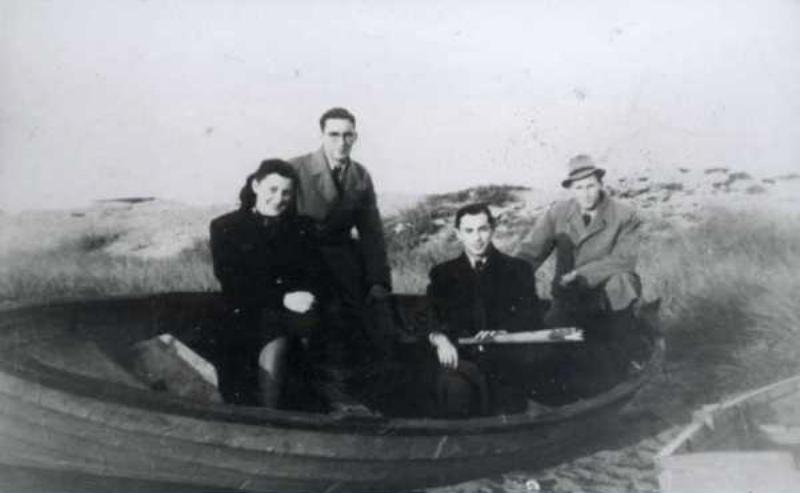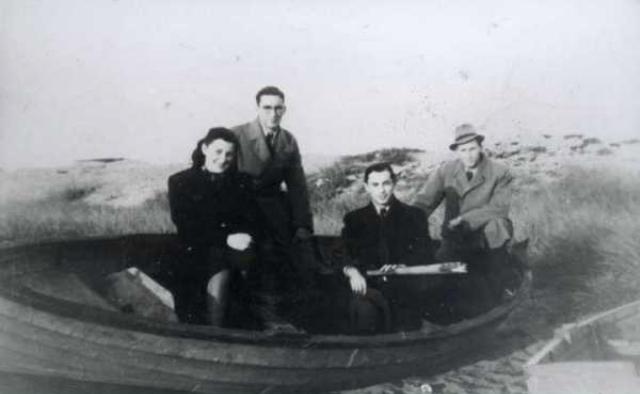


At a time when Germany was determined to rid the world of its Jewish population, one amazing country decided that it was going to protect this vulnerable group of citizens. In his book titled, “A Light in the Northern Sea: Denmark’s Incredible Rescue of Their Jewish Citizens During WWII”, Tim Brady tells the remarkable story.
Unlike many other European countries that maintained a veneer of civility to cover their blatant anti-Semitism, the Danes saw the Jews as their friends and neighbors. In 1814, yet another king granted them the full rights of Danish citizenship. In time, they became so well accustomed to Danish society that they began to think of themselves as Viking Jews.
Initially, the Germans occupied Denmark with a minimum amount of disruption in April 1940:
The German ambassador assured the king and the Danish government that both he and it would be respected and allowed to continue as the political powers within Denmark and that Germany would only serve as protector against the Allies.
But there were Danes who were furious about this capitulation without a fight. One family in particular, the Keitel family, were dismayed at the decision, and the oldest son, Jorgen, recalled this:
Jorgen would later remember feeling ‘boundless shame and sadness [as] he realized that Denmark had, in effect, capitulated without resistance, despite the assurances of politicians that they were going to defend us.’
He was not alone. Many Danes were determined to resist the occupation, although the Jews were not immediately in the forefront of their plans. The Germans had not made a demand initially of rounding up Jews, so resistance focused primarily on harassing the German occupiers. Two teenage boys who had moved to a new school in northern Denmark wanted to fight back:
Now, in Aalborg, in their new school, they formed a new group that they called the Churchill Club and called themselves the Churchill Boys, in honor of Great Britain’s wartime leader. Enlisting a handful of like-minded students at their school, the brothers and the club members began to pursue trouble in the form of small acts of defiance and sabotage against the Germans stationed in the Aalborg area.
When the Germans demanded the declaration of a state of emergency, the Danish Parliament decided it had enough:
On the morning of August 29, the Danish Government was ordered to declare an immediate state of emergency in the nation. They simply could not accept the German demands and still call themselves a proud nation. The government flatly rejected the stipulations and shut down its functions and offices. King Christian not only applauded the decision of his parliament but also actually declared himself a prisoner of war. The Danish government, cooperative or otherwise, was essentially over.
Without a Danish government in place, Werner Best, the plenipotentiary for the German government, decided it was an ideal time to give the go-ahead to Hitler to round up the Danish Jews. An earlier plan to deport the Jews had been discouraged by Best’s friend, German attaché Georg Duckwitz:
A German in charge of German shipping, Georg Duckwitz, heard an initial discussion to transport the Jews. Duckwitz over the years had become friendly with the Danish population, and knew that the disruption of moving the Jews would be a disaster in terms of Danish compliance. So he took steps to discourage Best from acting at that time.
But now the time was ripe, in Best’s estimation, for removing them, so Duckwitz quickly took action to warn the Jews, arranging for their arrival in Sweden. Finding them, however, presented its own challenges, even with the small Danish Jewish population of 8,000:
Most of the Jews traveling from the city in the first couple of days after the Swedish announcement headed toward the coastal towns, particularly toward the narrowest points of the Oresund, near Helsingor and Snekkersten, to the north of Copenhagen, which were only two and a half miles from Sweden.
[snip]
Back in the city, messengers mobilized by the resistance joined the Jewish community in going door-to-door in search of Jewish families. Some Jews took refuge with Gentile friends, Catholic churches, and Protestant ministers. Some found shelter in hotels, cellars, and warehouses. Some hid in the woods outside of Copenhagen, which prompted university students and members of the resistance to organize search parties to scour the forests, looking for Jews.
Saving the Jews caused multiple challenges: Sweden was reluctant at first to take in the Jews, and if Sweden were persuaded to assist Denmark, how would the Jews and others, such as resistance fighters, be transported across the channel? How would the resistance organize itself to complete its mission, which included bombing factories, hiding Jews, acquiring arms and ammunition, recruiting without being caught, and logistical relocation? How would they recruit fishermen and other boat owners to participate in this dangerous and demanding plan?
Tim Brady guides us through this tale with thoroughness and objectivity. He seems to avoid using language which praises the Danes and Swedes, but instead allows their activities and behaviors to paint a picture. It is a gripping story filled with intrigue and courage.
One observer who saw many boats head to Sweden made the following observation:
‘Nobody who has not attended an embarkation of that kind will be able to imagine the feelings that overcome those who are left behind and see the heavily loaded ship sailing off toward safety and freedom. Mingled are rage at human wickedness, sympathy and grief at the misfortunes of the persecuted, the excitement, the uncertainty, and the painful responsibility—above all the responsibility—but also the duty, and an elevating and strengthening feeling of friendship and solidarity of the task. Everything is dissolved into a strange, indescribable feeling of happiness when the work is finished.’
God bless the Danes.
In these times, it’s difficult to evaluate the degree to which Jews are accepted in the United States. Are we a people who have assimilated into the population, or are we living in a country that tolerates us and maintains a thin veneer of acceptance? If an organization develops that is prepared to target the Jews, will they be stopped by the larger population? Will the Christian community rise to our cause? Will the government protect us? Or will the Muslims in the guise of pro-Palestinian advocates decide to make us their targets? Is the current increase of anti-Semitism an aberration, or an indication of a burgeoning disease?
Only time will tell.

Image: Public domain.
